-
Title
-
The Little Apostle of the Mountain Province
-
Description
-
The organ of the Missionaries of the Immaculate Heart of Mary (Scheutveld) Fathers in the Mountain Province of the Philippines.
-
Issue Date
-
Volume 1 (Issue No. 6) November 1924
-
Publisher
-
The Catholic School Press.
-
Year
-
1924
-
Language
-
English
-
Subject
-
Baguio (Philippines) -- Periodicals.
-
Catholic Church -- Missions -- Philippines -- Periodicals.
-
Rights
-

-
Place of publication
-
Baguio
-
extracted text
-
107 Chapel of Ca new, 8ontoc built by the pennies of the Tondo Orphanage Pupils If Our Lord pra.ised the widow fo1· the mite she offered in the temple, what will be the reward of the little girls of the Orphanage of the Belgian Sisters of Tondo? Cent by cent they offered their mites, the mites of the poor girls, many of them orphans to build a chapel at Canew in the Mountain Province for other orphans who ignore God, a1 1d are a thousand times mare orp}l;ins than those who have lost their father and mother. But they were too poor to collect among themselves the sum required. What did they do? Some of them putting aside all human respect and full of zeal for God's work among their pagan brothers, went out to beg amongtheir more fortunate Christian brothers of Manila. This they did especially on the day when Christian hearts remember their dead, on All Souls day, and on the very spot where the living pay_ their respect to the dead: in the cemeteries of l\Ianifa. Who could refuse these valiant little children their mite, and certainly that mite given for God brought more consolation to the dead they sought to re108 lieve than the thousands of lights and the hundreds of wreaths which adorn the place of sorrow and death. The most hearty congratulations of the "Little Apostle" go to )Iiss )lathilde Alvarez, the captain of the Little Tonda-orphanage children. Her two most active lieutenants were the ,llary anll ,Sih-iu ,lfuylulm1g sisters )Tary and Sylvia Maglalang: together they collected nearly P: rno. "Where there is a will there is a way". What, if rich children had that will of the slaglalangs? Rich children, do you wish to know some more poor children of Tondo orphanage to be admired in the campaign for the chapel at Canew? The,v are the lit tie Misses Simeona Reyes, Dolores de Jesi.:s, Luz Espana, Natividad Fernand€Z: in fine, uarly all of the 5CO pupils of the Tonda Orphanage deserve the admiration of the Filipino Chri!<tians for their true Christian activity and charity whose efforts stand now as a monument at Canew: house Mis1 ~I. Aln;rez for God. And how could it be otherwise? E\·ery day they are witnesses and the object of the endless activity and unlimited charity of the Sisters of Tonda Orphanage. May the activity and charity of the orphans and pupils of the Tonda Orphanage find worth:· imitators among other Filpino children. Letter from father <ihysebrechts, of Hontoc, to the pupils of the Tondo Orphanage. Dear Children. Enclosed is the picture of one of the nicest chapels which was ever built in the Mountain Province: this chapel is yours. May God reward you and bestow His choicest blessings upon you and your worthy teachers, the Sisters. The chapel is built at Canew. Come and let us visit it in spirit. We shall leave Bontoc, cross the river (if it does not rain, for then the current would be too swift and we might be drowned), then climb a mountain towards the East. Steadily, steadily, children as you tread the grass aud the rocks. Let us take the least steep slope. Y 011 see there is no path. Slowly: you would soon be exhausted. Take a rest now and then under the pines.
120 r 9 •1 ~ 'wra ......... ~:.:.-llllll:~'!lllliiO:-t§O$J:!WIDl--.,j·~, I+ CURRENT EVENTS+ I ~~+,...._ll•i:l•Dl!IP~•Ql-:...:;--.?'-"3Wama.'+ •1• ,_.. -..cal Philippines With the Legislature. It is proposed by a bill to compose a national common language. Why not take as a common language the Tagalog dialect? Or why not use the three principal dialects of the Islands? Let them be taught in the schools. The bill proposing to give the women the right to vote was voted down. Hence individuals will be allowed to purchase 144 hectares of public land. Those who are qualified to apply for homestead shall be 16 years af age at least, pay an initialfeeof 2 P only. place under cultivation at least one third of the land within five vears and shall live in the province ~here the homestead is located. A proposition to suppress the cedula tax was rejected. The Sena.te plans to start agricultural colonies, administered by the Government and whose benefits would go to the nation. The sum of P500,0C-0 would be appropriated for that purpose. The Senate adopted the Fonacier bill making appoinments of superintendents of public schools suuject to confirmation of the Senate. The legislature would extend the right of voting at the coming elections to the inhabitants of the non-chrlstian provinces. A bill was signed by the Governor General making Pl,000,000 available as aid to provinces to build hospitals. The provinces who have alreadv hospitals under construction will be the first to receive assistance. Thanks to Senator Alegre the easy divorce bill was rejected. Senator Ale}andrino was reseated in the Senate with the right to vote but. deprived of his salary. Auditor Wright havingdeclared that certain members of the legislatrr~ abused their transportation privileges by charging the transportation expenses of their families to the funds of the legislature, the Senate wrote a protest against the Auditor accusing him of gross discourtesy for calling the above said expenses: "'legalized robbery." As a bill was proposed to introduce religious instruction into the public schools, so that anv student mav at the request of his p0arents receive. the religious instruction he wants, Senator Alegre attacked severelv the co-edueation system of the pubiic schools, as well as its irreligiousness. "There is rampant ignorance of God a.nd looi;:e morality in the schools", he said, "and the co-educational system hen· in ,-ogue is largely responsible for this deplorable situation." Are better days in view? The American Hood Rubber Comp11.ny sent a representative to study the possibilities of growing rubber in Mindanao. Mr. Deininger after a. six months' stay in Mindanao stated that in the "economic garden of Eden" (Mindanao) rubber, tea, colfee and quinine could be produced in greater quantities and at greater profit than in the Dutch possessions, but, he added, the development of plantations in Mindanao ought to be done by interests with large financial backing. Coir fiber of coconut husks is in great demand in Europe. Millions of these husk;; are wasted in the Philippinee. Since long, machines have been in use in the English Indies to extract the coir fiber. Why not introduce them into the Philippines? During the month of October prices of hemp reached a high figure, to fall down a little later. Last September Al bay again produced most hemp: 25,172 bales, with Leyte a close second, 2:l,261 bales. The total production in the P. I. was 125,375 bales. A great constructor from Hongkong declared lately that the best cement in the Far East was the Cebu cement. No wonder thus t.hat more and more Cebu cement is exported. Exportation of embroidery during the last five years (1919-1923) averaged a little less than PI0,500,000 of which 60?1> represents the wages of the workers engaged in the industry. During the month of September Cebu exported to foreign countries merchandise worth 1"3,574,258. Nevertheless more and more l:i.borers leave the Philippines for H awali, while the possibilities on the rich Filipino soil are unlimited. WHY ? What are the remedies? \Vifh busy readers. The Holy Father, Pope Pius XI.sent 1'15,000 to the typhoon sufferers of the diocese of Tuguegarao. ,,. Seventy-two, of whom 60 are women, passed their last examination for pharma.cists, although 24 of them, who passed only conditionally, wi.11 have to face another examination. 121 President Quezon and Senator Osmeila were given a hearty welcome on their return from the United States. Both are hopeful to see the next session of the United States' Congress pass legislation settling the Philippine question definitely by granting the Islands their long coveted independence. Both were feted at Tokio by the members of the J apaoese diet. According to President Quezon, Mr. Coolidge will be elected President of the United States. .;A Representative Recto, another member of the Filipino Independence Commission will arrive during this month. It is said that he will make sensational revelations about the independence situation in Washington. Of the 25,000 teachers in the public schools of the P. I., 10,363 are women. ,,. These last months the papers reported enormous numbers of Chinese immigrants. Questioned about this danger, Mr. Aldanese, insular collector of customs said that notall of the incoming Chinese intend to stay in the Philippines. 'lhe largest number of Chinese arrived in 1923. -14,676 were admitted, but that year too 12,020 Chinese left for China. .;A The dirigible ZR-3 made the voyage from Friedrichshafen (Germany) to the United States a distance of 5,066 miles, in 81 hours and 17 minutes. ,,. Tokio registered 4,096 earthquakes since the last terrible earthquake of Sept. 1, 1923. Lately it was discovered that the deepest place in the Ocean (32,636 feet), is at 145 wiles southeast of Tokio. ,,. Four Filipino girls, who arrived penniless in Seattle with the hope of finding a job, covering their expenses while studying at a college, had to be 122 placed under the care of the Sisters of the Good Shepherd : they did not find a jOb and so have many Filipino students been disappointed, when they landed in the United Stll.tes without the means of support. foreign China. About the :fifteenth of October the civil war between Kiangsu and Chekiang came to rather what the Chinese call the end. The Chekiang forces surrendered and an armistice was declared. Some of the Chekiang higher officers fled to Japan. Were they bribed to give up their arms? China is the classical land of bribery. When soldiers are sent to fight the bandits, they try to bribe them, rather than to fight them. In the meantime the bandits try to bribe the soldiers, to get weapons and ammunition. If both come to a clash, much shouting accompanies the shooting .... in the air mostly. Even in this civil war between Che.kiang and Kiangsu the casualties existed mostly in the papers and not on the battlefield. Most of the bullets were sent in a vertical and not in a horizont;il line. Why should the Chinese kill each other? Let the officers come to an understanding. This does not mean that the civil war has come to a happy end. In China there are three great men who for years try to become the leading force in the country: Sun Yat Sen at Canton, Wu Pei Fu at Peking and Chang Tso Lin in Manchuria. Sun these last days has seen his own sun eclipsed. So the real fight now is between Wu and Chang. Who will win? Let us look behind the curtains. Nearly all foreign powers favor Chang. He is not antiforeign. Wu is favored by the U. S. He hates the Europeans. In view of the harmony between foreign powers to support Chang, it is more than probable that the U. S. will let Wu play his own game. Both need foreign help : th~ one who gets most of it, will surely be the luckier at the end. And then, will China be free of civil war? The country is too big and th~ spirit of . di vision between the south and north, as between the different provinces, is too deep, to unite the Chinese efficaciously under one man. England. Premier McDonald has resigned. New elections will take place. In fact McDonald should have resigned long ago, or rather he should never have accepted the premiership. His labor party was weaker than the parties of the conservatives and the liberals. But these last two who have been alternatively in power for a long time, were unwilling to help each othe:r against the labor party. Rather than help each other to govern, they gave the premiership to McDonald, the leader of the labor party. In this they had a second reason, Both parties bad long been in struggle with France, about peace made and to be remade with Germany. But England could not overcome the stern opposition of France and of most of thA Allies. Rather than to give up their demands and to humiliate themselves, both parties gave the labor party a chance to smooth up the situation between England and the Allies. Lately the conference of London pacified more or less all contendants, so McDonald was of Iio further use and Liberals and Conservatives gave him his vacation. The new elections will decide what party shall dominate in England. The 6erman loan, prescribed by the London conference and to be subscribed by different countries of Europe and the United StateS, has been a complete success. In all the countries which had to 123 contribute towards the $300,000,000 loan to Germany, their part was greatly oversub..oeribed. This is a good sign for coming peace. With money in Germany, the other countries will seek to keep Germany in peace. War would mean the loss of that money. it Mission Week. These last ten ~·eal"i! the Mission Week, celebrate'd in all towr1s ac:d villages of Belgium and Holland, has been a source of immense revenues for the foreign missions. What is a Mission Week? Father N . . . • from T .... wants a Mission Week. He announces it to the people of his parish a few "·eeks in advance. In the mean time he writes to the different Missionary OrderS of his country. At the date fixed, the various Missionary Orders send one or mo·re of their Missionaries to the parish of Father N .... On the eve of the Mission Week, they open in one of the biggest halls of the parish a small Exhibition of objects and curios, that came from their missions. During the mission week any one is allowed to visit the fair, provided he leaves a certain ·a.mount of money, of course for the sup· port of the missions. On Sunday the Missionaries deliver a sermon at all the nf asses about their respeeti ve missions. A collection is taken up and nobody present would refuse bis generous alms for the missions. In the evening one or more of the Missionaries give a lecture in the hall of the Extlibition, again a.bout the missions. Useless to say that a new collection at the end of the lecture swells the already gathered funds. During the week various committees visit the houses of the cat.holic families of the ,·illage or town. The work is made known in the sermons and lectures: the Catholic people, interested in the apostolic work of the Missionaries and anxious tohelptbeircountrymen as well as the poor heathens of other countries, answer generously the calls of the members of said committees. And the result ? Here follows one of the last Mission Weeks at Brussels, Belgium. "The collectio11s in the Churches, parish and conventual, of Brussels, five parishes of Laeken, St. Gilles, the Sacred Heart, the Churches of the Carmelite Fathers, the Dominicans, the Fathers of the Blessed Sacrament, the Gesu, were 67,483 franks or 117, 496,03. The Exhibition : 39,340 franks or $7 ,868; the conferences : 7 ,060 franks or $1,412; the film: 10,739 franks or *2,H7,04; the schools that were invited to the exhibition and film o:lfered 15,000 franks or $3,000; the total, together with the funds co11ected by the Committees, amounted to 200,000 /ranks or M0,000 or PB0,000." 124 fortiter et Suaviter Education should becarried on with firumess a.nd gentleness. Unless it be a meaningless word "parental authority" is obliged at times to have recourse to admonitions, reprimands and even chastisements. Nevertheless, to facilitate the efforts on the part of the child, compelled to study much, and thus renounce attractive pleasure, parents and teachers must be gentle a.nd give their orders persuasively, trying to convince the children of the good and necessity of the order given. It is thus one obtains submission and better results from children. "If you know how to show maternal affection and good humor, if you have more frequent opportunities for rejoicing with your pupils, rather than for scolding and punishing them, everything will be easier for you" (Alfred Terrieres, Doctor in Sociology). The pa.rents' good humor (what is said about parents must be applied to teachers) is communicative. The children seeing them working joyfully and merrily, without murmuring against daily hardships and contrarieties, will naturally imitate them and be more self-possessed and more virile in character. They will more easily overcome little annoyances, which make others complain loudly. It is thus t.Patstrong characters are formed. The part of a mother in the education of her children is force tempered by constant devotedness to du t·y. Sweetness and gentleness on all oc.casions have charms for the little ones entrusted to her care. Wtiakness which tolerates faults in children and satisfies their every whim, discloses a lack of intelligence and true love. Such a weak mother does not see how these uncorrected faults increase in the child dispositions to commit them a.gain and again, and how they _form real habits: she spoils the child; no, she does not love her child truly. The little delinquent must be sometimes chasti.\ed, but without anger, and who corrects must gently persuade at the same time. Certain mothers by their gentle manners and occasional reprimands at "opportune moments" obtain obedience, relative peace and mutual endur~nce. Screaming, making noise, insulting, multiplying the following cautious words: "be quiet! ... Lea,·e me alone" are good for nothing, they may inspire fear, but they decrease respect and affec~ion. Instead of trying to make the child keep still, which is impossible many a time, why not turn to account its youthful and spontaneous outbursts and activity? Mother has to see to the babies: a constant exercise for her patience and gentleness. With sufficient will power on the part of their mother, the band of little ones will well understand that mother, though kindness itself, is als:> their "mistress." Parents ought to act firmly and gently, especially at the age when physical as well as moral personality is being developed and asserting itself. Too much indulgence does harm; on the other hand harshness fetters confidence, which ls so necessary for the young. Those in authority oup:ht tG be amiable by their condescendence to just desires, aspirations and efforts of the young: this way they win thP affection of the children and when one possesses the heart of a child, he controls also the will. One can thus with more success give a reprimand when it is necessary. But nevertheless one must never tfO beyond bounds: once the heart is shut,· educational influence is doomed to failure. Christian parents be~ God's help in a work on whic.h depends the happiness of their children. The wisest of parents will seek these. indispensable gifts of fortitude and meekness at their right source: frequent Communion, which will enable them to accomplish their task "fortiter et suaviter" (firmly and gently). ·
127 For the Little Tots To-morrow I \Viii be Good It was in the year 1918 at the end of the great war. Jean a French soldier from Paris had just arrived home. Alas ! the war had not made him better. He was a drunkard. This was due to bis friends who after work invited him for a drink to the next tavern. After the first drink came a second and a third and so on. So every night he went home without money and without brains. His poor mother had given him a very piom, education, but when one has become the slave of bis passion, his mother can only weep and pray : both she did. One evening, Jean as usually drunk, wason biswayhome. Passing by a church not yet closed, nobody knows why, Jean entered it and took a chair somewhere in a bidden corner. Very few people were in the church. After a while thty all left. The porter of the big church made a short inspectio:i of the building rattling his keys, but Jean had fallen asleep and not even thunder would have aroused him from his drunken sleep. The door was closed. Jean was alone in the house of God. How he slept! It was ten, eleven o'clock. Jean slept still on his chair. Midnight. Twelve times echoed the sounds of the big clock on the tower. Jean made a slight movement. All at once a voice yelled thru the dark naves. Jean woke up. He had heard that noise. He tried to look around, to figure out where he was. His trembling hands met only what he took for chairs. Again the voice sounded and this time it seemed louder than before : ' 'if somebody is here in the church who can serve mass, please let him approach and serve my mass.' ' This was enough to make Jean the most sober man in the world. He looked all around and lo ! at the door of the sacristy he saw . . . what ? ... a dim light . . . in the midst of it was the form of a priest dressed for Mass . . . Jean would have screamed but he dared not. Why was that priest there? What time was it? Where was he ? Then be remembered how 123 he had entered the church, how he must have fallen asleep. Again for the third time the voice of the priest asked for a server to serve his mass. While a boy, Jean had often served Mass. Shall he serve the Mass of that mysterious priest? He thought. He remembered the story of his mother who told him once how a priest, who during his life had forgotten to say a Mass, had come bai:k after death to celebrate the sacrifice he had forgotten in his negligence. This priest too might be a dead priest in need. "After all, said Jean, he will do me no wrong . . . I will go and serve his mass." This said, Jean approached the apparition. But when nearer d1e spectre, for a spectre it was, how Jean repented. There, at four steps away from him, stood a priest. His head was a skull. The :fit~gers with which he held the chalice were only tiny yellow bo11es, the extremes of a skeleton. The ghost addressed Jean in a pleading and hollow voice. "My friend, he said, will you serve my mas&? I will ask God to reward you greatly for your service." Jean wished he· had been at his mother's side. To escape was impossible. But then the ghost seemed to be well h1tentioned. Jean acquiesced to render him the service he asked. At this, the priest proceeded to the altar. Jean followed and found everything all at once ready. The candles were lighted, the water and wine were ready, the altar was uncovered and the book was at its place. As an ordinary priest the ghost mour.ted the altar aud came back again to say the prayers at the foot of the altar. Jean knelt trembling at-a little distance. Whenever the ghost bowed his sk•1ll or his skeleton, how the bones rattled! \Vhen he beat his breast with the bony fingers, how Jean shivered. The mass proceeded. Jean· brought the water to the ghost to wash his fingers ... jnst think of this: to pour water over the bony sticks protruding from under loose sleaves while the big vacant eye holes seemed to gaze at Jean. Jean would have preferred a bombardment in the trenches. Auyway he got through with his service. The Mass was ended. The last benediction was given. Then the ghost stopped and turned his skull towards his server, his visible white teeth rat· tlcd once more. ''Listen, he said, you have delivered me from purgatory. I thank you. In tum I will .render you a service. I tell you : next year at this date aud at twelve·at night. you will die. Go and prepare yourself." At this, the ghost dissappeared and left J eah alone and of course deep in thought. What? next year. h'! would die? And he had lived such a bad life. He, a drunkard for many a year, he would have to go before his God and judgeto give an account of his life,. so sinful, so bad. Oh! he would cha11ge all at once. To-morrow he would begin his penance, he would do great, terrible penance, for his sins were many and great, he would find a place in a convent and as .ll laybrother spend his last twelve months in the most holy life. Four hours more, he had to wait before he could get out of the church, gave him ample time to. strengthen his resolution. ( To be continited. J -----(Cum /icentia eeclesiastica) ·
k~ ,f~-~~tt_ tL[_ APO~-~~~ ·· ~li:f ~A:~~,Ra~1- ~i";i How to HeJp the Souls in Purgatory F™l: OVE:UBER: the month of ~ N = the Souls in Purgatory. Go ~ = ye, therefore, you Chrisb::~ tians, to the Church. You hope by your prayers and Holy Communions to ohtai n Sflme possible relief for your dear departed. Go ye, children, to the grave of yoi,u father and mother: your prayer~ on that doubly sacred.place and the thought of your gratitude will wipe away the tears of your sorrow. Go ye, all who have some beloved in the other world, where none defiled shall .entt>r Heaven without first being cleansed in the fire of God's justice. Go ye to the· Church or the tomb: for your beloved ones in Purgatory, your intercession with God will dry up their tears and bring them to the kiss of eternal peace in IH~aven. You are Christians, children of God, redeemed by His Blood : for you there is hope and you hope also in God's 1.nercy for your relatives and friends departed. Not so for the Igorote, not so for the Pagan. He too has a heart that loves but not the means to sh6w a helping love towards his dead. Nay, he may cry and weep bitterly over the corpse of his father or mother, of his brother or sister, of his child or friend, but his tears are sterile. He may pray to his idols or worship the ghosts of his beloved; in reality his didnities have no ears and his invocations are of no avail. The lgorote, too, has an immortal soul, which is the image of his Creator. God, too, wants to save him, to bring him to Heaven. Did not His Son become man and die on the Cross to save all people? And a pagan so-ql redeemed by the waters of baptism, it, too, becomes an infinitely beloved child of the Father in Heaven. At the conversion of a Pagan, there is more joy in Heaven than at the perseverance of ninety nine Christians. Ah! Christian, you sob these days at the thought of your dead in sorrow and pain. You love them. Oh! if could only save them and bring them into Heaven, what a joy you would feel and what benefactors you would have placed near God's heavenly throne to be your protectors forever. You pray, you attend 106 masses, you receive HolJ· Communion. You do well, you follow thus the teaching of your ~Iother the Church. But h:l\'e you ever thought of making an exchange with God? Have you ever tried to give Him a soul on earth, to obtain the redemption of a beloved soul in Purgatory"? Have :rou done your very best to fill Hea\·en with joy, with more joy than Heaven can feel at the perse,·erance of ninety nine just? In one word: have you done something for the conversion of a Pagan? In memory of your departed father, of ~·otu dear dereased mother, have ynu made a sacrifice for the conversion .of a Pagan who does not call God his Father and knows no Church as his Mother"? ln memory of your never forgotten c•hild who left your side to go to the grave, have you ever thought of gh·in!l to God a ne\,· child on earth, procuring the com·ersion of a Pagan? l\Iake a sacrifice. If you haw, much, gh·e much; if you have only lit.tie, gh·e of the little you ha,·e, but make a sacrifice for your pagan brother; make an offering for his soul's redemption, for his spiritual birth in Christ. Help the Missionary to deli,·er pagan souls from the abys,; of i1morance and eternal hopeless loss. Help him in view of helping the :;>ouls of your beloved departed ; help him to give souls to God on earth, in exchange for the souls of your bel•wed deceased, and let these belm·ed souls thus enter heayen, to partake of the· joy you shall have caused among the celestial inhabitants, when your material help shall have c01n-erte<l a brother of the 1\lountain Province into a brother of Christ. r-=• :e.=-o:ir;•wlCiiiiil __ ...,,.....:•K1sD!!FN~O•TQll•Cic:E-.-.a~• •w -marmA ! Do not send money by ordinary mail. Send it by M. O. or by ! i registered mail. These last two months, several letters adi L.:es~:d to the4L:le4~postle, :~=~ 139::;.;ver arrived:.....J The underlying idea of a Protestant service for the dead is to comfort the stricken hearts of the mourners. According to the Catholic idea, the Requiem Mass is for the soul of the dead. When a Catholic bereft of SO\lle loved one really understands this, there is a comfort and consolation in the_ Church's service for the dead that passes the understanding of those who know the difference between the Protestant and Catholic belief. The Catholic Church comforts and helps the living, by helping the dead. According to Protestant teaching, the departed soul is beyond all aid from the living, and so the funeral services are directed towards the consolation of those who are left behind.-Sacred Heart Review.
108 lieve than the thousands of lights and the hundreds of wreaths which adorn the place of sorrow and death. The most hearty congratulations of the "Little Apostle" go to )Iiss )lathilde Alvarez, the captain of the Little Tonda-orphanage children. Her two most active lieutenants were the ,llary anll ,Sih-iu ,lfuylulm1g sisters )Tary and Sylvia Maglalang: together they collected nearly P: rno. "Where there is a will there is a way". What, if rich children had that will of the slaglalangs? Rich children, do you wish to know some more poor children of Tondo orphanage to be admired in the campaign for the chapel at Canew? The,v are the lit tie Misses Simeona Reyes, Dolores de Jesi.:s, Luz Espana, Natividad Fernand€Z: in fine, uarly all of the 5CO pupils of the Tonda Orphanage deserve the admiration of the Filipino Chri!<tians for their true Christian activity and charity whose efforts stand now as a monument at Canew: house Mis1 ~I. Aln;rez for God. And how could it be otherwise? E\·ery day they are witnesses and the object of the endless activity and unlimited charity of the Sisters of Tonda Orphanage. May the activity and charity of the orphans and pupils of the Tonda Orphanage find worth:· imitators among other Filpino children. Letter from father <ihysebrechts, of Hontoc, to the pupils of the Tondo Orphanage. Dear Children. Enclosed is the picture of one of the nicest chapels which was ever built in the Mountain Province: this chapel is yours. May God reward you and bestow His choicest blessings upon you and your worthy teachers, the Sisters. The chapel is built at Canew. Come and let us visit it in spirit. We shall leave Bontoc, cross the river (if it does not rain, for then the current would be too swift and we might be drowned), then climb a mountain towards the East. Steadily, steadily, children as you tread the grass aud the rocks. Let us take the least steep slope. Y 011 see there is no path. Slowly: you would soon be exhausted. Take a rest now and then under the pines. Now that we are on the top, do not try to run down. Should you take one false step, you might fall never to rise again. Let us take the gentlest slope ! Once down the mountain, in the small valley, let us use our feet and hands to creep over the narrow stone walls which divide the ricefields. Do not fall, for you would come out of the sticky mud with great difficulty. Here we are at Canew. It took us o!lly three hours. You are good Alpinists. You see Canew is only a small village lost in the mountains. Father Billiet was the first Missionary in 1922 to visit this spot. And why is this village smaller than others in the district? Let us ask the Igorotes from other villages and they will tell us that Canew is and will always remain a small hamlet, unable to raise rice enough for its subsistence, because its inhabitants have killed the Son of God. I told them it was all a lie. they had not killed the Son of God, but that on the contrary the Son of God loves the people of Canew and that He would visit them, nay. even live among them. I told them [ would build a house for Him. That was your house, which you see here now in the center. It was blessed on the 9th of September this year, on the feast of St. Peter Claver: all the inhabitants were present; but one of them, Pedro; is the oaly Catholic. He has lived a long time with the Fathers at Bontoc. I baptized nine 109 children on that day. The Pagans made a real feast for the occasion. For three days they beat the gongs day and night. I celebrated Mass for them for the first time in your chapel. Father Jose from Bontoc nearly risked his life, fording the Bontoc river to attend the feast. During Mass the Catechist, Juan Manzano, recited the prayers with the people who said them very respectfully. After Mass we gave them a banquet with plenty of rice and meat, which. of course. they liked more than the religious ceremonies: they understood the banquet better ihan the ceremonies, although I had given them a long instruction. Nevertheless, in the evening a good many gave in their names as catechumens: a good beginning, thanks to you, dear children. I thank all of you who have contributed towards implanting the reign of Christ in Canew; also the Rev. Father Faniel, who spoke to you about the chapel, and the Rev. Sisters of the Tondo Orphanage, who animated you by their own example of restless activity and christian charity; the ninety little orpha:1s a:id tbe other four hundred p:ipils of the Orphai:age. May God bless you all. Your charity and example will excite the charity of other benefactors whom I shall not forget in my prayers. Your grateful missionary Marcel Ghysebrechts.
125 ·;~KAILBAG OFTHE LITTLE A~OITlE For all correspondence with "THE LrTrLE APOSTLE." send your letters to The Littl,e Apostle, Box 1393, 1'fanila. I have received many JetterS this month. Of course space forbids me to publish ar.d answer them all. Ar.d as Our Lord gave preference to little children, rn do I give. to a letter which came from a good little Tot. I do not change a word or a letter: Dear Father Vandewalle. I do not know how to write a letter. Teacher says I must not make condrachions in writing, but I do not know how to write the words, Eoeverything is left out. The big girls speak of gometry, sicology, in,·itation, condolence, busy frindlie letters, but I do not know what all this means. I am al"·ays punished for my leeeons. My name is Angela. T<-day is my feast for it is the Holy Angel Guardians. I like the sthories and the pictures in the "Little Apostle." I want to become a little Apostle, for I love God and His priests very much. I am Yery small. I am trying to learn Ingles, but she is Yery hard to me. I am ashamed to put my dress and name to this. I am praying Bail Mary for the miseioners in the Mountain Province. I do not like Gographie nor rithmetic, but I like my catchism more than all, for it teaches me about God, the Church and the dear Angel ever atmy side. Many centavos are going to the Little Apostle. As you see, dear readers, the . heart of little Angela is better than the mind, but let Angela study a few years more and she may perhaps write later nice stories for the Little Arostle. The example of Miss Ceferina Witte who sent P 5.CO of her pocket money to the Missions, has found a worthy imitator. Miss Crispine Stacy aleo sacrificed P5.CO of her pocket money. She is a student at the college of the Sisters of St. Paul de Chartres, of Tuguegarao. When eleven more shall ha.ve imitated thib example, I will publish their pictures all together as twehe Apostles, provided the next eleven who offer a certain amount for the Missions, send also their picture. The papers publish pictures of boxers, and even murderers. Why should the pictures of charitable children not be published ? They may excite otherS to do some.good. Miss Emma Smith from U.S. sent a gift of U0.00 for the mission of the Little Fl(Jwer of Bokod. Besides she sent a box of cloth for the naked of Father Claerhoudt's tlock and writes: "We were seYeral to contribute to this gift. Please permit me to say, Father. that nearly all of us who have contributed to this little charity are working girls, many of us with home obligations, so the amount must necessarily be small." 126 Just think of it: the amount of 1'80 was collected among nearly all working girls, some with home obligations. They could have used their poor salary on a thousand useful objects, but no: they remembered there were some 300,000 pagan people, not in their country, but in the Philippines, thousands of miles away. They had never seen the Igorotei;, but they liked them for God and the salvation of these poor ignorant people, and they spared even out of their mouth to do something for the benefit of souls. Does such an action please God? Does it appeal to you, dear· readers, for imitation? At least when you die, it will appeal. Thus do it NOW. It was what little Paz Campos and Lourdes Loring from the Assumption College, Iloilo, did, when they wrote: I enclose f'2.CO for the converi;i.on of your lit~le Igorotes. I also enclose 1'1.00 from one of my friends Lourdes Loring. I receive '"'fhe Little Apostle" every month and I like the stories for children especially the story of little Ines. I am in the 5th grade and Lourdes in the fourth. I hope you will have many lgorotes converted and that you pray for us that we may pass our examination. But listen Miss Paz, the next time you send any gift, do not send money in the envelope. Just send a Money Order. I tell you: this last two months, many letters (at least twenty) sent to me or the Little Apostle never arrived: the worst-of it was that they contained money. In Belgium you may see in all rail• road stations ·in big letters the following advice : beware of pickpockets. To you all who send in sub!criptions etc. I say: BEW ARE OF PICKLETTERS. And as a last advice, I repeat what I asked in the last number: dear children, sacrifice five minutes of your time to write a letter to a friend or to speak with a relative asking his or her subscription to "The Little Apostle." It is commonly said that a catholic paper or magazine can not prosper in the Philippines. Make that a terrible lie and you will deserve the gratitude of God, of the conYerted pagans, of their Missionaries and of. .. Yours respectfully in J. C. Rev. O. Vandewalle. P. 0. B. 1393. Manila. ~ CONTRIBUTIONS RECEIVJm Blessed Little Flower's fund for the Bokod Mission. Previousb· Receh-ed: - - - - - - - P 128.00 Fi-om Miss C£>f. Witte - - - - - - - " 2.00 Total PIS0.90 Miss Crispina Stacy, Tu1mega1·ao - - P 5.00 St. Paul's Institute, Manila. for Dalupirip - - " 20.50 3 Statues and clothes for the same. Assumption CollP.ge, for a catechist In llayaoyao - - " 30.00 Miss Paz Campos, Ass. College, Iloilo - " 2.00 Miss Lourdes L01•hur - - - - - - - - " 1.00 Miss R. Llzares, for Rev. !<'. BeuI"ms and Rev. F. De Brabandere - " 20.CO Anonymous for RPl'. F. De Brabande1-e " 5.00 Rev. F. Sindler. Tubungan - - - - - " 9.00 lllr. Wm. Cassin. Chicago,·- - - - - - " 8.00 Anonymous, U. S. - - -- - - - - - - " 8.00 Total Pl~S.50 All the Misslonarlesofthe P1-ovlncerecommend their benefactol's at each mass. We gratefully acknowlPdge the receipt of canceled stamps, for the beneOt of the Missions, from: Raldome1-o Berdan, Manila. ElisallPth Camantlles, ltogon, Benguet. Rev. P. Andres MarquPz. Batangas. Eutlqulano E. C. Sacay. Tubnran, Cebu. Bibiana Acosta., Tagudln, llocosSur . • Josefa Prudencio. Paslg, Rizal. lrinea Prudencio, " Sil vestra Prudencio " Rufo Velarde, Intramuros, Manila. 2. Clemente Aradillos, 107 Legaspi, Intramuros, ~lanila. Buenaventura Espina, Gra.l. Luna 73. Intramu1-os. Manila. · Montserrat Gamboa, Jaro, Iloilo.
112 heart. Lately the Father happened to call at her house to speak her in a gentle tone on perseverance, the love of Jesus, and of Heaven which will one day be her palace and her reward, and as he was giving his parting blessing she took hold of his hand saying with a trembling voice: "Apo Padi, I have only one desire ... take me once to Baguio, to the grand church, that I may feel that I am for once in our dear Lord's house." Who found America 1 Whilfl Columbus is usually credited with the discovery of America, it is certain that Cabot, sailing out of Bristol, beat him to the mainland, and it has also been claimed that the Norsemen, sailing via Greenland, had reached the American coast some centuries before that. A new theory, to the effect that it was the Irish who discovered America, has now, however, been advanced by Father Divine, a Canadian antiquarian, and Monsignor Evers of New York. According to Father Divine, maps recently discovered in the Vatican show that the whole coast of North America, from Nova Scotia to Florida, was known as Ireland the Great in the year 1000. Monsignor Evers, also basing himself on Vatican records, ascribes the discovery of the New World to Saint Brendan, the navigator, an Irish Bishop of the ninth century, who, he says, passed down the New England Coast as far as Delaware in the course of a missionary voyage. Supporters of the new theory also point to the similarity of the famous Round Tower at 1rnwport to the ancient towe'.rs in Ireland. My (iood Right Hand I fell into grief and began to complain; I looked for a friend, but I sought him in vain: Companions were shy and acquaintances were cold, They gave me good counsel, but dreaded their gold. "Let them go"! I exclaimed. "I've a friend at my side To lift me and aid me whatever betide; To trust to the world is to build on the sand;I'll trust but in' Heaven and my good right hand. My courage revived in my fortune's despite, And my hand was as strong as my spirit was light; It raised me from sorrow, it saved me from pain, It fed me and clad me again i..nd again. The friends who had left me came back every one, And darkest advisers looked bright as the sun: I need them no more, as they all understand,! thank thee, I trust thee ; my good right hand.
\Ve had lllso surface measures, like the tagpulo in Bisayan and the pisoson among the Bikols, etc. As to numerical system, the Filipinos always used the decimal, every ten being called p:do which in Tagalog is puo by suppressing the l in pu10. Hence, in Tagalog, ten is sampu, which is a contraction of isag puo; and in Bisayan it is n.ap71/0 in Leyte, a contraction of usa ga puo, and sakaf1t!o in Panay, by contracting the phrase isa ka pulo. The worci five is lima in the Fili115 pino diaiects, because in primitive Malay, lima was the name of the hand, which has five fingers. So in Tagbanwan, hand is alima. I have not gone into more detail., in order not. to charge your patience too much. But with the date given, I hope I have furnished informations about the practical manifestations of thP Filipino culture, besides its intellectual and moral aspects, ahout which I propo5e to speak in the next part of this lecture. II. Philippine Litt:rature. I shall now speak on Filipino literature. Of course, by literature, I mean here the collective body of literary productions. A people like the Filipinos, with a history and culture, must have, as they do have in fact, their literature. The information given in the first 'part of thi,.. iecture. although far from being exhaustive, shows, I hope, that the Filipino people in general possess culture, if we understand by culture the enlightenment and discipline acquired by mental training. It must be ohserved that the present culture of the Filipinos is the product of two main elements, to wit: the native culture possesserl for so many centuries. certainly not so fully developed in the Philippines, as it was in India, its place of origin, because these people were separated from their center their original native land, but developed by themselves in their own way under the peculiar circumstances in which they were placed by Providence. The second element of our culture is the occidental influence brought by the Spanish conquest and continued now with American contact. In speaking of Filipino literature, it seems proper to begin with the Filipino thought and style, which are the gist of all liternture. I shall, therefore, say something about the Filipino way oi thinking and expressing ideas, which is the oriental way, as differentiated from that of the Occidentals. I. Thought and Sentiment. The Filipino, when speaking with an o~cidental, is not always perfectly understood. Sometimes, the Filipino, generally courteous, anrl being respectful and reserved by na.• ture, answers with a smile whatever remark is made to him, even when it is not altogether pleasknt. Al116 though he perfectly knows that his occidental friend is wrong, and even if he has good rea.M>ns in his own favor, the Jt'ilipino usually keeps quiet. Of course, this way of acting is now undergoing imme change, due to the contact with the American people. The natural reserve of the Filipino is being diminished in ~ome individuals of the younger generation. And in some instances, the change is to such an extent, that the characteristic reserve gives way to an exaggerated boldness which undoubtedly is striking to Americans themselves. The change, however, is as yet far from being generalized. The great majority of the Filipino people continue to be attached to their native reserve, and it will take long before they all abandon it, if.it can ever be abandoned by them at all. It is due to this characteristic reserve, that, generally, the Filipino, who has already a family of his own, is very much attached to his home, where he considers to have everything, and has no need for any entertainment outside. This is why, except those accustomed to broader social life, the Filipinos are not generally enthusiastic about going to clubs every day and making it a part of the activities of life. As to the literary thought and style, there is a difference between the Filipino and the Occidentals. One of the most peculiar characteristics of the Filipino thought and sentiment as distinctively oriental, is the activity of imagination, as shown by the frequent use of metaphorical and symbolic language by means of figures of speech. The best example of Oriental literature is, for me, the Bible, which is fraught with symbols and parables. And the Filipino dialects bear these oriental charact~stfos, undoubtedly due to the fact that the Near East as well as the Far }<;ast, are both branches of the primitive oriental culture which had its beginning in the center of Asia, extending itself, with the stems of the human race, in a.11 directions. A Westerner who reads the Bible for the first time, may find in th~s book a loose style, and, if such reader il'.l of a religious temperament, he may attribute such style to the fact that the Bible is an ancient book inspired by God. This is, of course, true; but I believe it is due, in part, to the fact that the Westerner does not think nor express his ideas in the same manner as the Oriental. Moses, and the Prophets, the Evangelists, and the Apostles were orientals. The · Hebrew language, in which the Bible was originally written, is oriental. An ordinary example of this difference of thought and feeling between the Europeans and the Filipinos is the following: In Spanish they say "buenos dias"; in English, "good morning"; in French "bon jour"; in German "guten tag", or "guten morgen"; but in Tagalog, we say "magandag araw.p6" (beautiful day, sir or madam). Please note that the Spanish, the English and the French eay "good day'', that is, they go by utility and goodness, while the Tagalog prefers going by beauty, and says magandag araw, (beautiful day) and not mabutig araw, (good day). The P hi l i pp i n e Independence Commission has _just published a well presented book entitled "Beautiful Philippinesn. The title appeals to me as another striking manifestation of Frnpino psychology, showing, once more, that the. Filipino, instinctively, goes by beauty instead of going by utility. Otherwise, some less idealistic title could havt: been given to the book, likl' 117 "Progressive Philippines'', instead of "Beaut.iful Philippines". And, as I have said, the character of the Filipino is not usually manifested readily to the Westerner, especially when the latter does not speak in the dialed of the former. In the foreign languages, we do not always find adequate expressions to convey our thoughts. When we speak Spanish or English, we hardly think in either English or Spanish, so that mnch of our deficiency in the use of the occidental languages, may be attributed, partly, to our different mode of conceiving and expressing our ideas. (7'o b6 continued.) Price of a Discovery Documents recently brought to light assert what the discovery of America has cost. Christopher Columbus, as head of the expedition, re<1eived a sala:ry of $.'-120, or P640. Look for people now-a-days who would discover America for $2i, or P54 per month. The two captains of the ships under the command of Columbus got $180, or P360 a year. The sailors were given $2.25, or P4.50 per month. The equipment of the entire tl.otilla amounted to $2,800, or P5,600. Eatables, bread, wine, vegetables, meat, fowl cost $0.60, or Pl.20 per head and per month: in all $400, or P800. When Christopher Columbus returned to Europe. he was gh•en the sum of $4,400, or P8,800 as reimbursement as funds for the enterprises he had undertaken. This represents the ouGlay of the expedition, which lasted from August 3rd 1492 to March 4th 1493. If we add to the above sum $2,800, or !'5,600 for the equipment of the vessels, we shall see that one of the greatest discoveries, of which humanity is so proud, has cost only the sum $1,200, or P14,400. These figures have been obtained from Pinzon Brothers, shipowners at Palos, and thanks to whom Christopher Columbus was able to accomplish his first voyage. - "I saw you going into the tavern the other day" said Mich. -"It would have been worse to see me coming out" said Pat.
119 t R. F. PAUL LEGRAND Missionar.11 o.f Bauco, Mt. Proi:frice, drowned in the Bauco rii:er. A few days ago we recei\"ed the sad news that Father Paul Legrand, missionary of Bauco, )fountain Pro\·ince, was accidentally drowned in the river near his mi!'sion, on Sunday, October 12. The dear Father was born in Brussels, Belgium, in 1895. He received the H. Priesthooci'in the same town in 192'2. He arrived in the P.I. in November 1923. Was appointed to the mission of Bauco, in Jµne 1924, and died there on Sunday, October 12, 1924. Although accidentally drowned, nevertheless it may be said of Father Legri;.nd: ·'he has given his life for his ftock" and we, his confreres, although sad indeed at heart, we say with the Holy man Job: "God gave him, God hath taken him, may His Holy Will be blessed". Father Legrand started from Bauco on Saturday Oct. 11th in the afternoon on his way to Guinsadan, a hamlet of the Bauco mission, where he was to say mass on the next day. He would have gone on horseback, but on his way· he had to visit a sick dying person, which he could reach only on foot: so on foot he went to save a soul; for a soul he was ready to give his life. Had he not come last year from Belgium, abandoned his old mother and family in tears, to save souls in the Mountain Province? He could have lived an easy life in his country, but no, he wanted as Christ and with Christ to save souls. So, instead of his comfortable home at Brussels, he had since four months taken up his abode in the poor mission-house of Bauco. Young and strong, kind and gentle, already beloved by all the Igorrotes from Bauco and the surrounding ha1.1lets, he was the hope of the mission. Yes, he would save souls and manv. but God was satisfied with his good ~·ill, with the sacrifice of all that he loved most on earth: God took him on Sunday, Oct. 12th at 11 a. m. May God's Holy Will be blessed. On that Sunday, after Mass and an instruction at Guinsadan, Father Legrand came back on foot to Bauco. From 10 to 11 he walked hard. It was hot, "very hot" he said to his boy who was with him. Nevertheless under the burning sun ha.climbed the mountain and arrh·ed, exhausted from the march and the heat, at the Bauco mission. A little later he left his house and went riverwards. The boys thought he had gone to Vila to visit a sick christian, as he often did. It was four in the afternoon. The Christians of the mi..ssion waited on Father Legrand for the benediction. The Father had not come back. Where was he? The people were anxious and went in search of him. Near the river they found his cassock. Was it possible? Too terrible! Down the river they went, searching about in the little water the stream contained. Half an hour later they found the Father, in his bathingsuit, a meter and half under water. Blood flowed from his ears, mouth, eyes etc. Taken by a congestion the poor Father, unronscious, had been carried away by the river. Inst{lad of the expected refreshing bath after his tiring march, he had found death and he, who had begun to work to bring the souls of Bauco to heaven, had gone first. God had received his sacri fic.e and crowned his efforts and good will. l\lay God's Holy will be blessed. R. I. P.
11) THe Blind Little Ciirl of Bilis (Hamlet tuithin the missionary sphere of Baguio) a .11 .s,T 18 true to say that upon 11 = ~his earth love is nurtured = a on sorrow' and that the L:...d most perfect definition of the word love is ''Chant of Sorrow.'' Tinaya lived with her old mother at Bilis, but she had never seen the azure-tinted peaks, nor the green hills (sometimes overcast by clouds, at other times lighted up by the dazzling tropical sun), nor th~ immense table-lands st1·eaming with purple and gold at sunset, nor the vast ocean with its silver-colored water, ever in mysterious and continual motion. Poor_ Tinaya was blind ! Whilst her more fortunate companions were enjoying themselves dancing Ig.)rote dances under waving banana trees, little Tinaya lingered in the depth of her extreme solitude. Whenever she heard people talking of the beauties of nature she instinctively opened her eyes full wide to contemplate the light, the sky and nature in all its grandeur and charm, but alas! it was night, endless night to her. And again when she heard the voice of her old mother and loved ones, she stretched forth her hands in powerless gesture-if she could only see them with her heart! ... Oh, she alone knew how sad it was to love and not to be able to see! ... It seemed at times to this poor child that she was so isolated, so lonely on ea1·t.h, that day succeeded day in utt?r sadnes:<, bereft of delight in everything, that all her miserable existence pasf<ed hy without joy, without hope, and that one day she too would die without e\·sr realizing and satisfying her heart's desire .... But a day came when "Apo Padi" (the Father) passed that way and stopped at Tinaya's house. How she listened with open ears, :ind for the first time in her life, to things so new to her, and spoken in such genial, kind, compassionate encouraging, lifegiving, sincere and truthful words hy God's minister! Tears filled the eye,; and ~t thrill of joy went through the heart of this wild little lgorote girl. The Father went away, but not for long.for he soon returned to speak to ht>r again of tho~e g-reat Catholic truths which she had not forgotten. A third time he will come back to tell her about ''Apo Dios' ', Whose Heart is more tender than that of the bt>st of mothers, and Who is looking at her from Heaven, \Yho knows her sufferings, and Whose ardent and sole desire is to adopt her as His child. Then the Father remind.,: her of Jesus Christ Who died on the cross for love of us, and Who is longing to come and Jwell in her heart. Why did nobody ever speak to he1· about the truths of our holy Religion? Of this Father Who is in Heaven, Who sees all, Who pities all, Who loves, comforts and consoles us in all our trials? Oh, when she becomes a ChriE"tian our good God will come to her with the same immense tenderness as made Him die for us on the cross. Then she wili converse with Him and He will respond to :tll her q uerries, she will tell Him how sad it is to be blind, and He will understand because He knows all our human frailties .... , she will add that she has such little pleasure on earth, and He will f'nrich her soul with untold happiness, of which she has hitherto known nothing, and of which the Gospel says : Eye hath not seen, ear hath not heard, nor hath the mind of man ever conceived what joys God has prepared for those who love Him"... And God will be hers for ever! . . . When her mother and eompanions are in the fields at work, she will not be alone, no, no, God will be P,ver near His little child to encourage and console her. The soul that has God needs nothing, for she has Heaven on earth! This blind little girl whose soul was enamoured of God, encircled almost by the halo of ever increasing delight at the more complete knowledge of her future happy life, will, no doubt, long for with all her strenght and with a faithful, trustful heart will sigh after Baptism. If ever a heart burned with a desire of receiving the Sacrament of Regeneration, it was surely the heart of Tinaya. Wh.en the saving waters of Baptism flowed on her 111 forehead she was in a kneeling attitude with hands crossed and trembling on her breast, her lips moved in uninterrupted prayer, which the Father did not understand, but which must have gone straight to the thrQne of God. And just as from the hillsides glistening with dewy diamonds at sunrise, arises a soft haze which mounts to the sky, so from Tinaya's shining soul the first incense of prayer ascends to the mercy seat of the Most High. God had entered the soul of this blind little Igorote girl, God was henceforth to be the guest of this simple and pure heart, God was to speak to her, to keep her company, to console her, to be all in all to her, never again to leave her destitute of His presence! Now she is called Marcelina. Every day she says the Rosary on the set of beads given her by the Father. This rosary is a family souvenir which was given to him on the day of his departure from Europe, but he deprived himself of what he prized so much in response to a mysterious voice speaking within his soul, and gave his precious rosary to his first conquest at Bilis: the dear little girl. Every day Marcelina says the fift.een mysteries on this very same rosary for the conversion of her fellow country men. As the days go by her soul is becoming more beautiful and peaceful, because her best friend is Jesus, Who alone can fully satisfy the hitherto infinite void which she felt in the depths of her 112 heart. Lately the Father happened to call at her house to speak her in a gentle tone on perseverance, the love of Jesus, and of Heaven which will one day be her palace and her reward, and as he was giving his parting blessing she took hold of his hand saying with a trembling voice: "Apo Padi, I have only one desire ... take me once to Baguio, to the grand church, that I may feel that I am for once in our dear Lord's house." Who found America 1 Whilfl Columbus is usually credited with the discovery of America, it is certain that Cabot, sailing out of Bristol, beat him to the mainland, and it has also been claimed that the Norsemen, sailing via Greenland, had reached the American coast some centuries before that. A new theory, to the effect that it was the Irish who discovered America, has now, however, been advanced by Father Divine, a Canadian antiquarian, and Monsignor Evers of New York. According to Father Divine, maps recently discovered in the Vatican show that the whole coast of North America, from Nova Scotia to Florida, was known as Ireland the Great in the year 1000. Monsignor Evers, also basing himself on Vatican records, ascribes the discovery of the New World to Saint Brendan, the navigator, an Irish Bishop of the ninth century, who, he says, passed down the New England Coast as far as Delaware in the course of a missionary voyage. Supporters of the new theory also point to the similarity of the famous Round Tower at 1rnwport to the ancient towe'.rs in Ireland. My (iood Right Hand I fell into grief and began to complain; I looked for a friend, but I sought him in vain: Companions were shy and acquaintances were cold, They gave me good counsel, but dreaded their gold. "Let them go"! I exclaimed. "I've a friend at my side To lift me and aid me whatever betide; To trust to the world is to build on the sand;I'll trust but in' Heaven and my good right hand. My courage revived in my fortune's despite, And my hand was as strong as my spirit was light; It raised me from sorrow, it saved me from pain, It fed me and clad me again i..nd again. The friends who had left me came back every one, And darkest advisers looked bright as the sun: I need them no more, as they all understand,! thank thee, I trust thee ; my good right hand.
113 The Psychology of the Filipino By Hon. Norberto Romualdez Associate Justice of the Supreme Cm1rt of the Philippine Islands (Continuation) During tht first centuries of the Spanish regime, Philippine commerce abroad was controlled by the the Government, and carried on trade with Mexico, the port of Acapulco being the place for unloading the Filipino products. Here is a view of Acapulco, from Blair and Robertson: There is <tn old manuscript written in Bi;:ayan in which the (hle of Kalantiaw, mentioned before, is containe<l, and also a Filipino calendar. Thh• manus1'.ript dates back to the year 143?,. Its original has been delivered to Don Marcelino Orfila, a resident of Saragosa, Spain. It was translated into Spanish by Don Rafael )Jurnyedro y Zamanew. Fr. .Jose ::\Ia. Pavon, while a parish priest of the town of Himamaylan, Occidental Negros, caused the translation to be copied by his clerk .Juan Antonio Collado in the years 1838 and 1839, this copy being entitled "Lns A nii£ttas Leyendas de la Isla de Negros". This copy was sent to the Philippine Library and Museum by Mr. l\larco, of Pontevedra, Occi114 dental Negros. The bibliographer Mr. Artigas, published said Filipino calendar in "El Renacimien/o Filipinil", of its special edition on its anniversary, in .July, 1913, page 73. Here is a view of this Filipino Calendar: According to the explanations given in said manuscript, the months of the year are represented in this calendar. The names beginning with that corresponding to the month of January, are these: Inaginid, Ulalen, Dagagkahoy, Daganinan, Kilin, Inabuyan, Kaway, Kaoy-os, Irarapon, Manalulsol, Birawhan, and Katimugan, each month having 30 days, and the last 26 days. This information seems to be confirmed by Loarca, who ran over the whole Archipelago in about the year 1576, and wrote a book entitled "Relaci6n d? las Islas Filipinas." Said Don Miguel de Loarca, gives the native names of eight months of the year and stating that ·the other four months had no names because no agricultural work was done during them. I say that Loarca's information tends to confirm what is stated i!1 the manuscript above referred to, because the names of the months given in both accounts are very similar and some of them identical. Here are the names given by Loarca: Ula/en, Dagagkahoy, Daganenan, Elquilin, Inabuyan, Cavay, Yrurapun, Manalulsul. As to weights and measures, the early Filipinos had the talaro, which was a kind of scales of balances. I have already mentioned the ta/zel, one halfof which was called tegti, and one fourth, sapa/za. For weighing, they used the sinantan, one half of which was called banal. For dry goods they had the kaban, (bakid in Bisayan), and the Tagalog sal6p (gantag in Biss,y:an) which four last terms are still being used by our people. For lineal measures, we had, and still have, the dipa in Tagalog (dupa in Bisayan), which is the equivalent of the English fathom. The dankal in Tagalog (dagaw in Bisayan), which is the length between the ends of the thumb and the middle finger both extended. The tumur6 in Tagalog ( baragitan in Bisayan) which means the length between the ends of the thumb and the forefinger both extended. These measures were regulated by the Spanish Government in 1727. \Ve had lllso surface measures, like the tagpulo in Bisayan and the pisoson among the Bikols, etc. As to numerical system, the Filipinos always used the decimal, every ten being called p:do which in Tagalog is puo by suppressing the l in pu10. Hence, in Tagalog, ten is sampu, which is a contraction of isag puo; and in Bisayan it is n.ap71/0 in Leyte, a contraction of usa ga puo, and sakaf1t!o in Panay, by contracting the phrase isa ka pulo. The worci five is lima in the Fili115 pino diaiects, because in primitive Malay, lima was the name of the hand, which has five fingers. So in Tagbanwan, hand is alima. I have not gone into more detail., in order not. to charge your patience too much. But with the date given, I hope I have furnished informations about the practical manifestations of thP Filipino culture, besides its intellectual and moral aspects, ahout which I propo5e to speak in the next part of this lecture. II. Philippine Litt:rature. I shall now speak on Filipino literature. Of course, by literature, I mean here the collective body of literary productions. A people like the Filipinos, with a history and culture, must have, as they do have in fact, their literature. The information given in the first 'part of thi,.. iecture. although far from being exhaustive, shows, I hope, that the Filipino people in general possess culture, if we understand by culture the enlightenment and discipline acquired by mental training. It must be ohserved that the present culture of the Filipinos is the product of two main elements, to wit: the native culture possesserl for so many centuries. certainly not so fully developed in the Philippines, as it was in India, its place of origin, because these people were separated from their center their original native land, but developed by themselves in their own way under the peculiar circumstances in which they were placed by Providence. The second element of our culture is the occidental influence brought by the Spanish conquest and continued now with American contact. In speaking of Filipino literature, it seems proper to begin with the Filipino thought and style, which are the gist of all liternture. I shall, therefore, say something about the Filipino way oi thinking and expressing ideas, which is the oriental way, as differentiated from that of the Occidentals. I. Thought and Sentiment. The Filipino, when speaking with an o~cidental, is not always perfectly understood. Sometimes, the Filipino, generally courteous, anrl being respectful and reserved by na.• ture, answers with a smile whatever remark is made to him, even when it is not altogether pleasknt. Al
118 Frnm Solarw, Nuei·a Yizcaya. Father Waffelaert writes: the frontside of my poor church has been considerably damaged by the typhoon of October 3d., but I hope to be able to have it repaired before long. JI. From Bitgabag, Nue1:a Vizcaya. Father Degryse is doing his utmost best to complete a new chapel in the hamlet of Tuao. This chapel, when completed, will mark a very consoling progress towards the religious revival of his people. He writes : The immigrants from Santa Lucia have built a chapel with iron roof in one week. It was inaugurated on the feast of St. Lucia. Miss Matilde Lumauig, a high school student and member of the sodallty of the children of Mary passed away. Until her last moment she prayed, together with her three sisters. Before she died she told her mother, brothers and sisters not to cry, for God called her, she said, and she felt happy to go to Him. All the children of Mary attended mass for her and offered one Holy Communion. JI. From Bokod, Benguet. Father Claerhoudt, while retained at Bisale by the stormy weather writes: I am here in Bisale in the house of Ama Francisco. Outside the rain falls by torrents. The day before yesterday I left Kabayan, after having traveled around for more than a week, from Libong to Gossaran. Last Thuri:day in Daclan, I had the pleasure of baptizing Ygme Lamsis, ex-president of Bokod. Useless to say that our good catholics rejoice in this event. Next Monday I will go back to Liboong, because the Mambunung (pagan priest) of that place, wants absolutely to be baptized. Lately he had a serious row with his wife. Just think of it: she opposed hisconver<>ion. JI. From Dupax, Nt1eva Vizcaya. Father Dewit asked 10 subscriptions to the "Little Apostle." · That is an example for the whole province. JI. From Baguio. Five lfugaos stabbed an Ilocano boy, took away the lower jaw and cut open his feet to tap off his blood: all this to celebrate one of their st..1perstit}ous feasts. Only the Christian education of this poor people, will stop them in the observance of such barbarous customs. JI. Actually a great fear reigns in nearly the whole lfugao subprovince. Lately several have been murdered. The relatives of the once murdered are on the look out for a blocdy revenge and rarely do people dare go to visit other towns or even to pass near. When will this stop? When christianity shall have taught them to forgive their old inveterated hatred for past murders.
112 heart. Lately the Father happened to call at her house to speak her in a gentle tone on perseverance, the love of Jesus, and of Heaven which will one day be her palace and her reward, and as he was giving his parting blessing she took hold of his hand saying with a trembling voice: "Apo Padi, I have only one desire ... take me once to Baguio, to the grand church, that I may feel that I am for once in our dear Lord's house." Who found America 1 Whilfl Columbus is usually credited with the discovery of America, it is certain that Cabot, sailing out of Bristol, beat him to the mainland, and it has also been claimed that the Norsemen, sailing via Greenland, had reached the American coast some centuries before that. A new theory, to the effect that it was the Irish who discovered America, has now, however, been advanced by Father Divine, a Canadian antiquarian, and Monsignor Evers of New York. According to Father Divine, maps recently discovered in the Vatican show that the whole coast of North America, from Nova Scotia to Florida, was known as Ireland the Great in the year 1000. Monsignor Evers, also basing himself on Vatican records, ascribes the discovery of the New World to Saint Brendan, the navigator, an Irish Bishop of the ninth century, who, he says, passed down the New England Coast as far as Delaware in the course of a missionary voyage. Supporters of the new theory also point to the similarity of the famous Round Tower at 1rnwport to the ancient towe'.rs in Ireland. My (iood Right Hand I fell into grief and began to complain; I looked for a friend, but I sought him in vain: Companions were shy and acquaintances were cold, They gave me good counsel, but dreaded their gold. "Let them go"! I exclaimed. "I've a friend at my side To lift me and aid me whatever betide; To trust to the world is to build on the sand;I'll trust but in' Heaven and my good right hand. My courage revived in my fortune's despite, And my hand was as strong as my spirit was light; It raised me from sorrow, it saved me from pain, It fed me and clad me again i..nd again. The friends who had left me came back every one, And darkest advisers looked bright as the sun: I need them no more, as they all understand,! thank thee, I trust thee ; my good right hand.
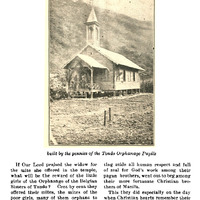 Chapel of Canew, Bontoc
Chapel of Canew, Bontoc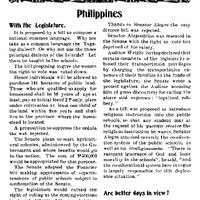 Current Events
Current Events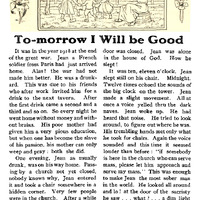 For the little Tots to-morrow I will be good
For the little Tots to-morrow I will be good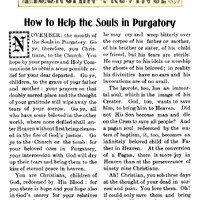 How to help the souls in purgatory
How to help the souls in purgatory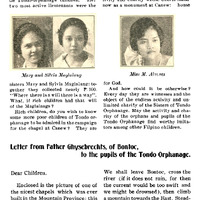 Letter from Father Ghysebrechts, of Bontoc, to the pupils of the Tondo orphanage
Letter from Father Ghysebrechts, of Bontoc, to the pupils of the Tondo orphanage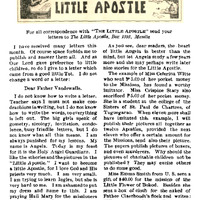 Mailbag of the Little Apostle
Mailbag of the Little Apostle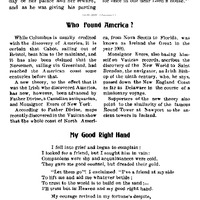 My good right hand
My good right hand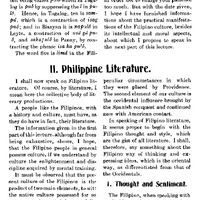 Philippine Literature
Philippine Literature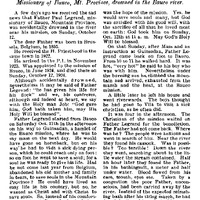 R.F. Legrand
R.F. Legrand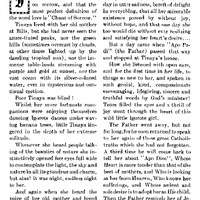 The blind little girls of Bilis
The blind little girls of Bilis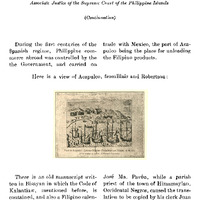 The Psychology of the Filipino
The Psychology of the Filipino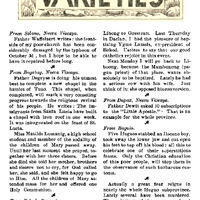 Varieties
Varieties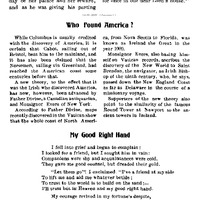 Who found America
Who found America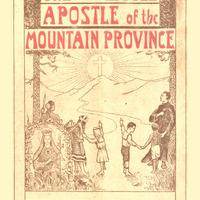 The Little Apostle of the Mountain Province
The Little Apostle of the Mountain Province